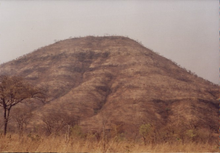Batoka Formation
| Batoka Formation Stratigraphic range: Early Jurassic ~180–179 Ma |
|
|---|---|

Batoka basalt flows at Siyakobvu, Kariba District, Zimbabwe
|
|
| Type | Geological formation |
| Unit of | Upper Karoo Group, Karoo Supergroup |
| Overlies | Forest Sandstone Formation |
| Lithology | |
| Primary | Basalt |
| Other | Sandstone |
| Location | |
| Region | Zambezi River valley |
| Country | Botswana, Zambia, Zimbabwe |
| Type section | |
| Named for | Batoka Gorge, Zambezi River |
| Named by | G.W. Lamplugh |
The Batoka Formation is a geological formation in the Zambezi valley in Botswana, Zambia and Zimbabwe. It is predominantly a volcanic unit comprising mainly basalts, with Lower Jurassic sandstone that contain Vulcanodon fossils.
The formation is a volcanic unit, consisting mainly of high-titanium, low-potassium tholeiitic basalt flows, with small layers of aeolian sandstone and siltstone between some of the flows.
The lavas are dark, vesicular and porphyritic or massive basalts, with occasional pillows, although rare dacites and rhyolites have been reported from some areas of north-eastern Botswana. The vesicular and massive basalts occur in alternating bands, with the vesicular bands usually being the top and base of each flow. The basalt mineralogy consists of mainly of plagioclase, augite, magnetite, some ilmenite and volcanic glass. In the Hwange area, vesicles consist mostly of quartz, chalcedony or calcite, though zeolites, such as stilbite, mesolite and laumontite, are dominant towards Victoria Falls and in the lower Deka valley, and are common in north-eastern Botswana.
...
Wikipedia
